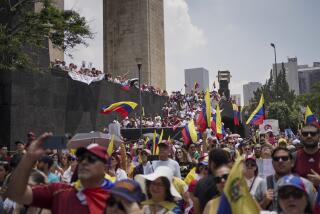Leftist Humala claims victory in Peru
- Share via
Reporting from Lima, Peru — Ollanta Humala, a leftist former army officer, claimed victory late Sunday in Peru’s tense and divisive presidential election after partial returns showed him defeating the daughter of a disgraced former ruler.
“We’ve won the election,” Humala told a roaring crowd in Lima’s Dos de Mayo Plaza. “We will form a democratic government open to civil society.”
Humala, a nationalist promising better distribution of Peru’s considerable wealth, had held a lead of about 2 to 3 percentage points over Keiko Fujimori, according to an earlier “quick count” of votes conducted by three polling firms and the advocacy group Transparencia.
Acknowledging the trend running against her, Fujimori had appearing before a crowd of supporters five hours after the polls closed and said she would accept defeat if official results confirmed it.
Both candidates raised considerable concern about the future of democracy in a country that is one of Latin America’s largest and fastest-growing economies. The runoff polarized the nation, and the new president will almost certainly lead a weak, troubled government.
Humala, whom opponents likened to Hugo Chavez, the radical socialist president of Venezuela, has terrified the nation’s traditional elite. But many Peruvians believed Fujimori to be nothing more than a proxy for her authoritarian father, who is serving a 25-year prison sentence for corruption and human rights abuses during his decade-long rule in the 1990s.
Jose Oyague, 71, wept as he watched early exit polls give a comfortable lead to Humala.
“This is a rejection of corruption and impunity,” said Oyague, whose 21-year-old daughter, Dora, was pulled from her university dorm in 1992, along with eight other students and a professor, and shot to death by paramilitary squads that Fujimori’s father was convicted of authorizing.
“If Keiko Fujimori were to be in charge, our lives would be in danger,” he said.
Both candidates have had to fight to overcome their past to gain credibility with a skeptical and dispirited public. Many Peruvians expressed dismay at the choice and with voting mandatory, some considered nullifying their ballot.
According to final opinion polls before Sunday’s vote, Humala, 48, was creeping past Fujimori, who had maintained a tiny lead. He steadily harped on the theme of corruption, an especially vulnerable spot for Fujimori, 36, and cast himself as a remade moderate despite his alleged support for a coup led by his brother in 2005. At one point, he swore on a Bible that he would respect democracy and the constitution, distancing himself from Chavez, who has rewritten the Venezuelan Constitution to stay in power.
Whether or not the transformation is genuine, Humala is widely seen as a pragmatic politician. He narrowly lost the presidential election in 2006 to Alan Garcia.
“Humala in 2006 was a very scary figure,” said Steven Levitsky, a Harvard political scientist working this year in Peru. “But two-thirds of Peru does not want radical change, and Humala had to make inroads with them. He is clearly pragmatic, and if he wins, he won’t have a mandate to bring the house down.”
Others remained distrustful.
“I don’t believe in such sudden change,” said Fernando Rospigliosi, a former interior minister who said he reluctantly backed Keiko Fujimori. “His 40 years of formation tells us he is not a democrat.”
Peru has one of the fastest growing economies in Latin America, sustained for a decade or more by high prices for minerals and other commodities it exports. Peru’s richest have become very rich, a bustling middle class has emerged in cities. Nationwide, the poverty rate has declined to 30%, but it is twice that in parts of the long-neglected Andean highlands and jungles, which are also the source of much of its wealth.
“We all have to go out and vote without fear, with confidence and hope, and with enough memory,” Humala said Sunday before voting.
Many Peruvian voters seemed to have formed their opinion of Keiko Fujimori based on what they think of her father’s government, which, despite egregious abuses, is also credited with slowing hyperinflation and cracking down on guerrilla organizations.
“The first Fujimori government, her father, made terrorism disappear completely,” said Andrea Mamani, a Fujimori supporter who at 18 was voting for the first time. “She will give us milk and open soup kitchens,” Mamani added, recalling some of the populist programs of the senior Fujimori’s regime.
“It is a question of dignity,” countered Fausto Mayorga Lucar, 65, a retired bank employee who supported Humala. “We cannot permit the child of a murderer and thief, who is serving time in jail, to become president.”
As predicted, Fujimori did best in Lima, the sprawling capital where she has a base among the poor, who benefited from her father’s populist programs, and the business elite. Most of the conservative, Lima-based national press, fairly openly backed her. But elsewhere in the country, including major cities such as Arequipa, the second-largest, Humala was winning by large margins.
Daniel Abugattas, spokesman for Humala’s Gana Peru (Peru Wins) political coalition, said the first task of a Humala government would be to dispel the raft of fears promoted, he said, by social media networks that have been warning of property confiscations and urging Peruvians to take their money out of the country.
“None of that is true,” he said. “We won’t expropriate even a dog.”
Nobel literature laureate Mario Vargas Llosa, who campaigned for Humala and against Fujimori, telephoned a Peruvian television station from Europe to offer reassurances.
“In no way does the victory of Humala represent a step backwards” for the economy, he said. “But if he does not stick to his commitments to democracy and freedom, I will be the first in line to remind him of his promises.”
More to Read
Sign up for Essential California
The most important California stories and recommendations in your inbox every morning.
You may occasionally receive promotional content from the Los Angeles Times.











